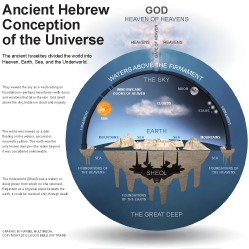19:title–14 This psalm celebrates God’s Law and thus is classified as a Torah psalm. (The Torah is the Hebrew term for the first five books of the Bible.) It may combine two separate psalms, since the second half (compare vv. 1–6, 7–14) differs in content and tone. The first half describes how God’s creation proclaims His glory (vv. 1–6). The psalmist then extols the beauty and value of God’s Law (vv. 7–11), and asks Yahweh to keep him blameless and acceptable (vv. 12–14). The two halves also use different names for God. The first uses the Hebrew word el (“God”) while the second uses yhwh (“Yahweh”). The difference in divine names may simply reflect the difference in content. The Hebrew name el emphasizes God as Creator, while yhwh—God’s personal covenant name—relates more to the Law (see Exod 3). The psalm as a whole emphasizes that God, the supreme Creator, reveals His perfect Law to His people. |
19:title A psalm of David See note on Ps 3:title.
19:1 the glory of God Yahweh created the heavens (referred to as shamayim in Hebrew) and the sky, expanse, or firmament (raqia' in Hebrew) to reveal His glory (see Gen 1:1, 6). People in the ancient Near East often worshiped the sun, moon, and stars as gods—something specifically prohibited by the Law (see Deut 4:19; 17:3)—rather than the Creator whose glory they reflect.
19:2 they tell knowledge Creation reveals the knowledge of God’s supremacy.
19:4 in all the world The expanse of the heavens declares God’s glory to the entire earth. Paul may have had this psalm in mind when he spoke of God’s invisible attributes (Rom 1:19–20).
a tent for the sun In ancient Near Eastern cosmology, the sky was believed to be a dome-like structure encircling the earth.
19:5 like a bridegroom An image of festive joy. The bridegroom would be adorned with fine clothing (Isa 61:10; Song 3:11), and a joyful procession would accompany bride and bridegroom (Jer 7:34).
a strong man The Hebrew word used here, gibor, most likely describes an athlete who runs a race with strength and vigor. The two analogies—bridegroom and strong man—emphasize the radiance and power of the sun.
19:7–9 The psalmist makes a series of statements using different Hebrew terms for the Law or Torah (as recorded in the first five books of the Bible). He describes the law (torah), testimony (eduth), precepts (piqqudim), commandment (mitswah), rules (mishpat), and fear (yir'ah) of Yahweh with positive attributes. The psalmist also describes the effect of the Law to revive, give wisdom, cause rejoicing, and enlighten. |
 The Formation of the Old Testament
The Formation of the Old Testament
19:7 is perfect The Hebrew word used here, tamim, means to be “perfect” or “blameless”; it emphasizes personal integrity.
19:8 is pure The Hebrew word used here, bar, emphasizes moral purity.
19:9 are true This highlights the trustworthiness of God’s Law.
19:10 more desirable than Like wisdom, the Law is more valuable than gold (Prov 3:13–15) and sweeter than honey (Ezek 3:3).
19:11 your servant is warned The Law serves as a warning against evil (Ezek 3:17–21) and brings reward for those who keep it (compare note on Psa 19:7–9).
19:12 Acquit me The psalmist petitions God for forgiveness. The word naqah means “to acquit” or “leave unpunished” (Job 10:14).
19:13 keep back your servant The psalmist also asks God to keep him from sin.
I shall be blameless The word tamim, also used to describe the Law (Ps 19:7), emphasizes integrity or innocence. See note on Job 1:1.
19:14 acceptable The Hebrew word used here, ratson, often indicates God’s acceptance of a sacrifice (Lev 1:3; 19:5; Isa 56:7). The psalmist offers up his words, hoping they will be pleasing to Yahweh.
my rock The word used here, tsur, highlights the stability and protection Yahweh provides (see note on Psa 18:1–3).
my redeemer The word used here, go'el, illustrates Yahweh’s protection and care as He defends and delivers His people. See note on Job 19:25.
 Go’el Word Study
Go’el Word Study

|
About Faithlife Study BibleFaithlife Study Bible (FSB) is your guide to the ancient world of the Old and New Testaments, with study notes and articles that draw from a wide range of academic research. FSB helps you learn how to think about interpretation methods and issues so that you can gain a deeper understanding of the text. |
| Copyright |
Copyright 2012 Logos Bible Software. |
| Support Info | fsb |
 Loading…
Loading…

